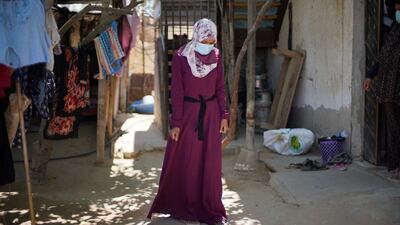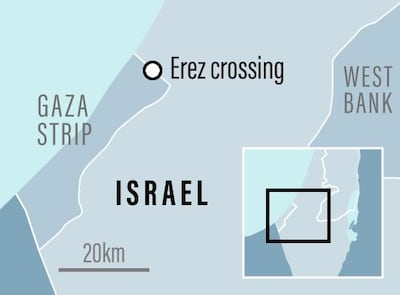Najlaa Al Dibari was diagnosed with blood cancer last year at the age of 23. On diagnosis she was told the radiation treatment required to fight the disease was not available where she lives in the enclave of Gaza, only in occupied East Jerusalem.
This means navigating the complicated system that allows travel between the two Palestinian territories, a task made harder by her need for a companion to help her make the arduous journey.
Two treatment sessions in July and October have taken a toll on her body; her mother Najat Salman now helps her move around with a wheelchair as the tumor on Najlaa’s spine has led to nerve damage and the cancer treatment made her frail.
Najat, in her late forties, stays by Najlaa’s side as they scramble to take private taxis at their own expense each time they go for treatment. The journey requires the pair to pass through the Israeli Erez crossing, only after securing a referral from the Palestinian Authority and a permit from the Israeli side.
The daughter’s three requests for a permit from the Israeli authorities have been approved, but her mother has been denied access for the third journey.
"We have been waiting since November and thought it might have to do with Coronavirus restrictions," Najlaa told The National. "We have learnt in a phone call that there's a hit on my mother's name and she needs to wait."
“We re-applied immediately after the first rejection late last month but got the same response to wait with no explanation. We already feel the stress because of my cancer and now we have to endure this uncertainty to get my mom a new permit again to help me in the hospital.”
Najlaa and Najat’s case represents one of hundreds of Palestinians in Gaza who must go through the permit process every month to get medical treatment in the occupied West Bank and East Jerusalem.
World Health Organisation figures – from September 2020-March 2021 – show that 5,482 permit applications were submitted to the Israeli authorities for patients from Gaza to cross Erez for medical care in the West Bank including East Jerusalem, in Israeli hospitals or in Jordan.
Applications approved totalled 3,897 (71 per cent), while 44 (0.8 per cent) of applications were denied and 1,541 (28 per cent) were delayed, and patients lost their appointments in the hospitals.
In the same period, 6,514 permit applications were submitted for patient companions, of which 2,897 (44.5 per cent) were approved, 264 (4 per cent) were denied and 3,353 (51.5 per cent) were delayed.
Cancer patients topped the list last year representing 48 per cent of the cases.
Complex permit process
Health infrastructure in the Gaza Strip is not adequately equipped to cope with several conditions that require medical attention in hospitals with advanced facilities.
Israel and Egypt have severely restricted the movement of Gaza residents and goods since Hamas took over the strip in 2007 following a violent split with the Palestinian Authority in the West Bank.
The 41km territory is home to nearly two million people. Israel annexed it in the 1967 war and withdrew its troops and thousands of settlers in 2005.
The health services have been greatly undermined by years of conflict, frequent power cuts and grinding poverty.
Najlaa looked dejected when she found out about the rejection of her mother’s application, which came at short notice just one day before her third appointment on March 21.
“I had a stroke in my right leg in July and was rushed to Al Hilal hospital in Gaza, I have a tumour on my spine and can’t risk a surgery as it will leave me paralysed for the rest of my life if I survived leukaemia, I can’t walk on my own because of the radiation and therapy,” she said.
She missed the March appointment due to the lateness of the rejection and was forced to go to a new appointment unaccompanied on April 19 at Augusta Victoria in East Jerusalem. She has to stay there for six weeks.

Except for residents of East Jerusalem, access of Palestinians from territories occupied by Israel since 1967 and the blockaded Gaza Strip is governed by the Israeli permit regime.
We brought Najlaa's case to the attention of the Israeli military.
The Coordinator of Government Activities in the Territories (GOGAT), the Israeli military body dealing with civilian affairs in Gaza and the West Bank, would not comment on individual cases but said it has decided to reduce the movement between the Gaza Strip and the occupied West Bank as well as East Jerusalem since Hamas’ takeover of the strip in 2007. Only humanitarian cases are the exception, it said.
It added that “each request received by COGAT is individually assessed on its merits, receiving a thorough examination that involves all the relevant professional offices and subject to security considerations.”
Rights activists, however, argue that the Israeli permit system violates relevant international laws and hampers the right of free movement of the Palestinians.
Israel has further tightened the restrictions at the Erez checkpoint since the start of the pandemic in March 2020, which led to a dramatic decrease in the number of exits from Gaza. Hamas does not currently deny the exit of a Gaza patient unless they don't get an Israeli permit and imposes a self-isolation period of 10 to 14 days at home when patients return to the strip.
“Israel’s ongoing control over movement through Gaza’s crossing points to Israel and the West Bank, comes with legal obligations toward the population living under its control. According to international law, it must facilitate normal life in the Strip, including allowing access for civilians and civilian goods, and establish reasonable and proportionate security measures,” says Miriam Marmur the International Media Co-ordinator at Gisha, an Israeli not-for-profit organisation whose goal is to protect the freedom of movement of Palestinians, especially Gaza residents.
The Palestinian Centre for Human Rights, which works in close coordination with Gisha and advocates for the Gaza patients who are denied permits or have their applications delayed, urges the Israeli authorities to consider permits carefully as it could be a matter of life or death for some cases.
Najat, the mother, is bracing herself to fill in the permit application all over again with the hope of catching up with her daughter.
“I have to go to her and keep trying. No treatment in Gaza. There’s nothing in Gaza,” she said.
Additional reporting Salem Al Rayyas in Gaza



